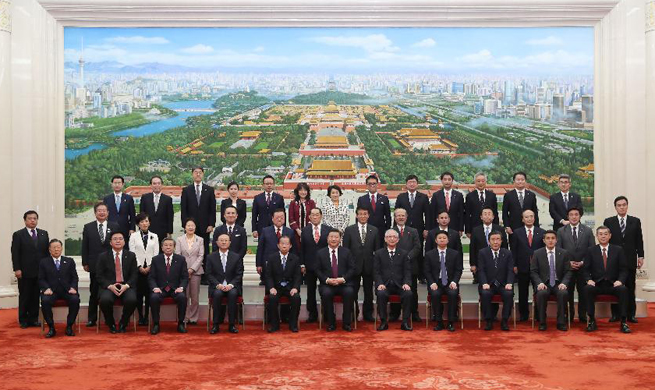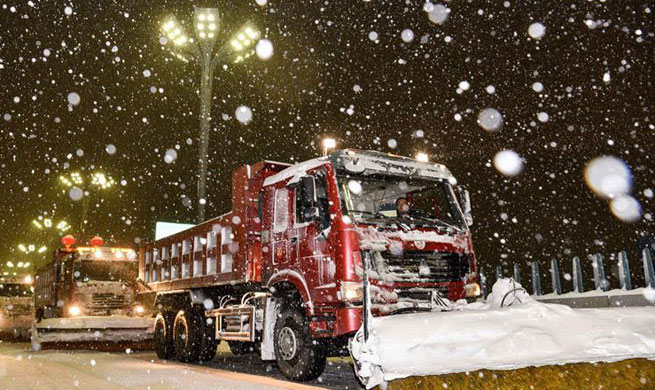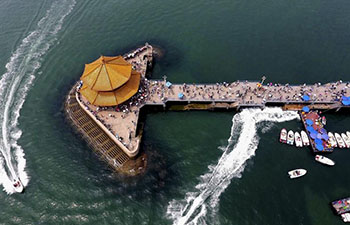TOKYO, Dec. 28 (Xinhua) -- Japan's Abe administration marked its fifth year in office in 2017. While the government is raising the defense budget to a new record high and plans to further boost the nation's military strength by introducing more state-of-the-art military equipment, local analysts expressed concerns that such moves would contradict Japan's war-renouncing Constitution and further rattle the postwar order.
INCREASINGLY RISING MILITARY EXPENSES
Japanese Prime Minister Shinzo Abe's cabinet approved last week a record-high budget plan for fiscal 2018, with the defense budget hitting an unprecedented 5.19 trillion yen (around 45.93 billion U.S. dollars), up for the sixth straight year under the Abe administration.
The budget is expected to cover a shopping list of increasing numbers of state-of-the-art military hardware for the nation, including more F-35A fighters, V-22 Ospreys and the Standard Missile-3 Block 2A which has been co-developed by Japan and the United States.
Japan has also decided to introduce two land-based "Aegis Ashore" missile defense systems. Each system, developed by the U.S. Lockheed Martin Corp., costs around 100 billion yen (885 million U.S. dollars), defense ministry officials said.
Some 730 million yen (6.46 million U.S. dollars) in the budget for fiscal 2018 will be used to prepare for the introduction of the two systems, as well as 62.2 billion yen (0.55 billion U.S. dollars) in a supplementary budget for the current fiscal year.
The Japanese government is also planning to acquire air-launched cruise missiles with a range far longer than the current ones, including Norway's Joint Strike Missile with a range of about 500 km, and Lockheed Martin Corp.'s Joint Air-to-Surface Standoff Missile and Long Range Anti-Ship Missile, both having a roughly 900-km range.
What has been causing further concerns is the government's reported plan to modify its flat-topped destroyer Izumo and turn it into an aircraft carrier from which fighter jets can take off and land, which would largely boost Japan's striking ability.
Observers here have pointed out that the huge budget as well as the increasing number of most advanced weaponry far exceed the needs of a country that is constitutionally bound to hold a purely defensive military stance.
Japan's pacifist Constitution has banned the nation from maintaining land, sea, and air forces, as well as other war potential, and Japan's defense white paper has specified that Japan should not own offensive weapons such as intercontinental ballistic missile or "attack aircraft carriers."
"People should be alarmed that Japan's defense-only policy is in danger of being completely abandoned under the Abe administration," said well-known Japanese military critic Tetsuo Maeda.
PACIFIST CONSTITUTION AT STAKE
Experts here are also concerned that Japan's pacifist Constitution, which is key to the nation's peaceful development over the past seven decades, is now at stake.
Following a dramatic victory in a snap election in October, the ruling Liberal Democratic Party is now pushing ahead with the prime minister's long-cherished desire to revise the Constitution, experts said.
Though Abe stressed that there was no schedule for the plan, local analysts said that the ruling party is expected to craft its amendment proposals and present them during the ordinary Diet session to be convened in January, 2018.
The plan has drawn staunch criticism from opposition parties as well as from the public for "opening the way for unlimited use of force."
Some 40,000 people gathered outside the parliament building in Tokyo on Nov. 3 to protest against Abe's attempts to amend the pacifist Constitution on the occasion of the 71st anniversary of the promulgation of the Constitution.
A recent Jiji press survey showed that 70 percent of people were against revising the Constitution in 2018.
But following the general election in October, the LDP, its junior coalition partner the Komeito party and other pro-constitutional reform forces occupied two-thirds majorities in both chambers of the Diet, and required to formally propose parliamentary debate on amending the Constitution.
What could possibly impede Abe's plan would be an unfavorable result of a national referendum needed to begin proceedings to legally change the Constitution.
Experts pointed out that as a referendums starts, there are no guarantees either way, with uncertainties always a possibility, as was the case with Britain's shock vote to leave the European Union.
Prof. Liu Di of Kyorin University in Tokyo, however, said that Abe has turned to the flag of "making Japan a normal country" in an attempt to win sympathy.
"The possibility that he might succeed in this could not be ruled out. Abe changing the pacifist Constitution is to challenge the postwar order dominated by the U.S. In the long run, it might pave the way for Japan to become a military power again," said Liu.?

















